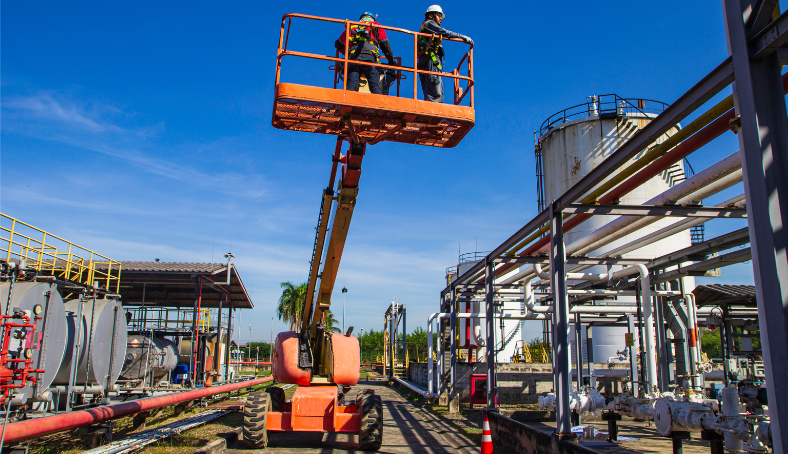Safety in the Skies: Comprehensive Aerial Lift Training Programs

In the fast-paced world of material handling and logistics, the demand for efficient and safe aerial lift operations is higher than ever. As industries continue to grow, so does the need for skilled professionals who can navigate the skies safely and effectively. Aerial lift training programs play a pivotal role in ensuring the safety of both operators and the workplace. In this blog, we delve into the importance of comprehensive aerial lift training and how it can significantly enhance safety standards in the skies.
The Significance of Aerial Lift Training:
Aerial lifts, including scissor lifts, boom lifts, and cherry pickers, are essential tools in various industries, facilitating tasks that were once cumbersome or even dangerous. However, the operation of these lifts comes with inherent risks, necessitating thorough training programs to mitigate potential accidents. Aerial lift training is not just about complying with regulations; it is a commitment to creating a safer working environment for all.
-
Compliance with Regulations:
Aerial lift training programs are designed to ensure compliance with local and international safety regulations. Regulatory bodies mandate specific training requirements for operators to guarantee that they possess the necessary skills and knowledge to operate aerial lifts safely. Rapid Forklift Training’s comprehensive courses align with these regulations, providing operators with the tools they need to comply with industry standards. -
Reducing Accidents and Injuries:
Accidents involving aerial lifts can result in severe injuries and even fatalities. Aerial lift training programs focus on risk assessment, hazard recognition, and safe operating procedures to minimize the likelihood of accidents. By imparting practical knowledge and hands-on experience, these programs empower operators to make informed decisions in challenging situations, preventing accidents before they happen. -
Enhanced Efficiency and Productivity:
Well-trained aerial lift operators are more efficient and productive in their roles. A comprehensive training program covers not only the basics of operating the equipment but also emphasizes productivity and time management. Operators who are proficient in using aerial lifts can complete tasks more swiftly and accurately, contributing to overall workplace efficiency.
The Components of Comprehensive Aerial Lift Training:
To truly enhance safety in the skies, a comprehensive aerial lift training program must cover various essential components.
-
Theoretical Knowledge:
Understanding the principles behind aerial lift operations is fundamental. Rapid Forklift Training’s programs include in-depth theoretical knowledge, covering topics such as equipment components, load capacity, stability considerations, and emergency procedures. This theoretical foundation ensures that operators are well-prepared for the practical challenges they may encounter. -
Practical Skills:
Hands-on training is indispensable in preparing operators for real-world scenarios. Practical skills training involves operating the actual equipment, navigating obstacles, and practicing emergency response procedures. Rapid Forklift Training’s state-of-the-art facilities provide a realistic environment for operators to hone their skills, building confidence and competence. -
Safety Protocols and Procedures:
Safety should be at the forefront of every aerial lift operation. Training programs must emphasize safety protocols and procedures, including pre-operational inspections, proper use of personal protective equipment (PPE), and adherence to established guidelines. By instilling a safety-first mindset, operators become vigilant and initiative-taking in maintaining a secure working environment. -
Emergency Response Training:
Unforeseen circumstances can arise during aerial lift operations. Rapid Forklift Training’s programs include comprehensive emergency response training, equipping operators with the skills to manage critical situations calmly and efficiently. From equipment malfunctions to rescue procedures, operators learn how to respond effectively, minimising the impact of emergencies.
The Role of Technology in Aerial Lift Training:
Incorporating cutting-edge technology into aerial lift training programs enhances the learning experience and better prepares operators for the challenges they may face in the field.
-
Simulations and Virtual Reality:
Simulations and virtual reality (VR) training provide a safe and controlled environment for operators to practice their skills. Rapid Forklift Training leverages advanced simulation technology, allowing operators to familiarise themselves with different scenarios, including adverse weather conditions and challenging terrain. This immersive experience enhances decision-making skills and prepares operators for the unpredictable nature of aerial lift operations.
-
Online Learning Platforms:
In today’s digital age, online learning platforms play a crucial role in delivering training programs. Rapid Forklift Training’s online modules provide flexibility for operators to learn at their own pace, ensuring that they absorb the necessary information thoroughly. Online platforms also allow for continuous learning and refresher courses, keeping operators up to date with the latest industry standards and best practices.
Aerial lift technology evolves, and regulations are updated to address emerging challenges. Rapid Forklift Training is committed to continuous improvement, ensuring that training programs stay current with industry advancements. Regularly reviewing and updating course content allows operators to stay abreast of the latest safety measures, technological innovations, and regulatory changes. Moreover, achieving and maintaining certification through these programs demonstrates a commitment to ongoing professional development, reinforcing a culture of safety in the workplace.
-
Creating a Safety-Conscious Culture:
Comprehensive aerial lift training extends beyond individual operators; it permeates the entire workplace culture. Rapid Forklift Training emphasises the importance of communication and collaboration among team members. When everyone is educated on the principles of safe aerial lift operations, a collective responsibility for safety emerges. This culture of awareness and accountability fosters an environment where each team member actively contributes to maintaining the highest safety standards, creating a workplace where everyone plays a crucial role in ensuring safety in the skies.
Conclusion:
Comprehensive aerial lift training programs are paramount in ensuring the safety and efficiency of aerial lift operations. Rapid Forklift Training’s commitment to providing top-notch training goes beyond compliance; it is about creating a culture of safety in the skies. By equipping operators with the knowledge, skills, and mindset needed for safe aerial lift operations, we contribute to a workplace where both people and productivity can soar to new heights. Invest in safety, invest in training, and let us continue to build a future where the skies are not just the limit, but a space where safety prevails.

